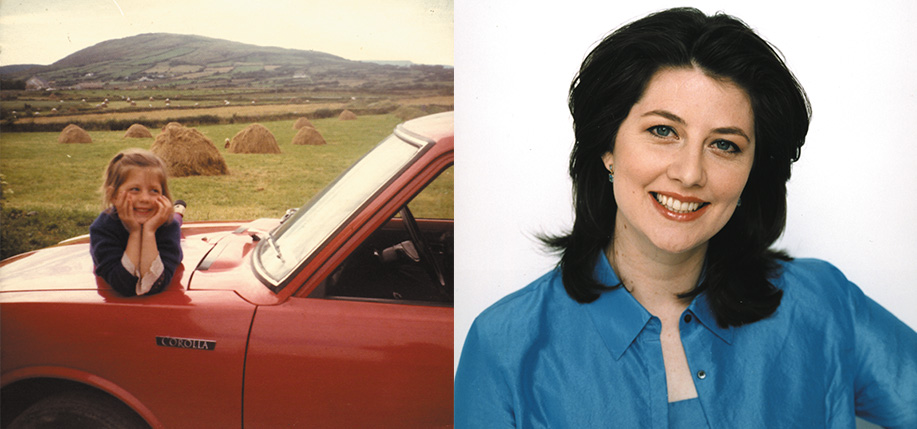When I was 13 years old, my mother took my siblings and me to Rockaway Beach in New York City for the day. After we romped in the ocean and were sufficiently sunburned, we ended up at a rather run-down Irish tavern that was hosting a singing contest. Since I can carry a tune, my mother made me enter.
All the entrants, adults and kids alike, sang well-known Irish songs. I sang “Do Re Mi” because I didn’t know any Irish songs (other than “Danny Boy” and that was already taken). The crowd gazed at me with mild puzzlement as I nervously made my way through the simple Sound of Music tune.
I received tepid applause and my brothers laughed their heads off. I knew I was better than the girl who won first prize and the blue ribbon with her who-killed-the-cat version of “Four Green Fields,” but that didn’t matter – her song connected with the crowd and mine didn’t.
It was that episode that kept returning to me as I thought about what it means to be an Irish American. I couldn’t pinpoint why exactly, but as I sat down to write this essay, the reason gradually came to me. Growing up, there was always something to remind my siblings and me of where we came from – whether it was the stories of Cuchulainn and the leprechauns my Mayo-born father would enthrall us with, or the delicious soda bread my mother baked.
Of course, each March there were lively St. Patrick’s Day celebrations. And there was always music. Many times, my father would play John McCormack or listen to Irish radio stations on a Sunday morning. To be honest, I never gave those songs much thought. I had no idea that the “Four Green Fields” was a reference to Ireland’s four provinces. Perhaps the image I had of Irish music was tied to those cheesy songs like “When Irish Eyes Are Smiling” or “McNamara’s Band,” songs that I was secretly embarrassed to know.
In my late teens, my parents took my two younger brothers to Ireland. At the time, I had no interest in going back (I was there once when I was just a child). All I could think about was three weeks with no parents around. When my brothers came back saying they had the best time ever, I was surprised and more than a bit jealous. They really got in touch with their roots, reading up on the country’s history and getting into its music, The Chieftains, Wolfe Tones, Black 47, and The Saw Doctors.
It rankled me that they knew so much more about Ireland than I did – wasn’t I just as Irish as they were? I began to look at old photos of my father’s family and to ask him questions about what it was like for him growing up and why exactly he had to leave to come to America. I soon realized that I would never truly understand and embrace my heritage until I went back to Ireland and experienced it for myself.
And so I did. I visited my mother’s relatives in Cork and my father’s family in Mayo. People that hadn’t seen me in 20 years or had never met me at all welcomed me into their homes for tea and sandwiches as if I were a long-lost daughter. I immediately sensed that I belonged there. To visit the graves of my grandparents filled me with an emotion I never expected to feel.
At one get-together, someone produced a guitar and the singing began. They were singing classics like “The Town I Loved So Well,” “The Fields of Athenry,” “Spancil Hill,” “The Flower of Sweet Strabane,” “Only Our Rivers Run Free,” and “Flight of the Earls.” I felt foolish for not knowing the words, but more than that, I felt incredibly left out. For to understand those songs is to understand not just what your own ancestors have gone through, but the ancestors of practically every Irish family.
As I knew I would, I returned to Ireland soon after that amazing two-week trip. Late one evening in Mayo, as I sipped a Guinness by the turf fire of a local pub – a pub that my father and uncles frequented years ago – a singalong was inevitably started.
As people belted out heartfelt versions of the old standbys, I gathered up my courage. Yes, this time I was prepared. I sang “Carrickfergus” (with my last name, I thought it was entirely appropriate). The crowd looked on appreciatively, some even mouthing the words. For each person it meant something different, but it meant something to everyone. It was a magical night for me, and I plan on having many more like it in the future.
I fully embrace my Irish heritage and am proud to call myself an Irish American. And someday soon, I’m sure, I will get over not winning that blue ribbon. ♦
A frequent contributor to Irish America, Jill is now a Senior Editor at Fodor’s Travel.


Leave a Reply